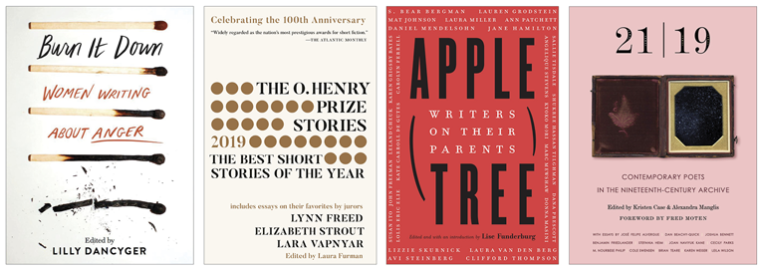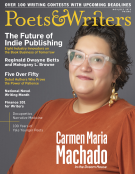Among the many new books published every month is a shelf full of notable anthologies, each one showcasing the work of writers united by genre, form, or theme. The Anthologist highlights a few recently released collections, including Burn It Down: Women Writing About Anger edited by Lilly Dancyger.

In Burn It Down: Women Writing About Anger (Seal Press, October 2019), editor Lilly Dancyger invites a diverse group of women to explore both personal and public rage “without being packaged or used for someone else’s gain.” Essayists Rowan Hisayo Buchanan, Melissa Febos, Leslie Jamison, Shaheen Pasha, and others trace the role of anger in their lives and the forms it takes while asking who gets to be angry and why.
![]()
A century ago the O. Henry Prize was founded to “strengthen the art of the short story and to stimulate younger authors.” This year’s installment of the annual anthology, The O. Henry Prize Stories: 100th Anniversary Edition (Anchor Books, September 2019), edited by Laura Furman, testifies to the continued vigor of the form—and to its evolution. Stories from Rachel Kondo, Weike Wang, Bryan Washington, and others capture the scope, ambition, and nerve of contemporary short fiction.
![]()
In Apple, Tree: Writers on Their Parents (University of Nebraska Press, September 2019), edited by Lise Funderburg, twenty-five authors write about the traits they’ve inherited from their parents. In original essays, Mat Johnson, Ann Patchett, Laura van den Berg, and others reckon with table manners, fashion sense, laundry habits, and quirks handed down to them, exploring the ways we are made by our families.
![]()
The essays in 21 | 19: Contemporary Poets in the Nineteenth-Century Archive (Milkweed Editions, August 2019) plumb the traditional American canon—and significant texts on its periphery—to contend with the questions of national ethos and identity that resound today. Editors Kristen Case and Alexandra Manglis suggest the ways poetry might be both agitator and balm in times of social crisis, as thirteen poets write about topics such as Poe and race, gun violence, and the Black pastoral.









